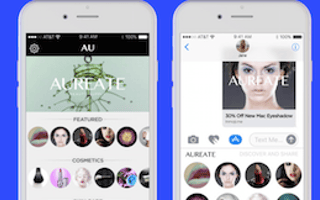
From Disney pop star to serial entrepreneur, Michael Africk's career path has been nothing short of nonconventional.
More than a decade ago, he opened for music sensations like Britney Spears and N'Sync. Today, Africk spends most of his time thinking about emojis — but not just any emojis.

Africk (pictured right) is the CEO and co-founder of Boston startup Inmoji, a company that believes clickable emoji represent the marketing campaigns of the future.
Inmoji's platform lets advertisers create their own clickable branded emoji, which, when clicked, send recipients to content like movie trailers, music videos, coupons or images.
So far, many of the big brands Inmoji has partnered with have seen significant success.
When Universal Studios used an Inmoji campaign to promote the DVD release of “The Secret Life of Pets,” the Inmoji was seen over 17 million times and clicked 336,000 times. Starbucks also used the platform to promote a new frappucino and saw their Inmoji viewed over 10 million times.
The startup has also worked with brands like Disney, Netflix, Target, Nickelodeon and more, reaching more than two billion mobile consumers using messaging platforms like Badoo, ooVoo, iMessenger 10 and BlackBerry Messenger, which have Inmoji baked into their messenger services.
Users see Inmoji icons and the marketing campaigns on their messenger application of choice and can choose to use them in their conversations. If they send an Inmoji and the recipient clicks on the branded icon, the user is sent to the campaign.
“We believe this is the future of advertising and communication in the sense that we’re giving you the ability to express yourself more clearly and inject real-world color into your messages,” Africk said. “You don’t have to write, ‘Starbucks’ in your message. You can put a Starbucks Inmoji in your message and show which Starbucks you are at. Instead of saying you want to go see the ‘Minions’ movie, we let you add the movie tickets for the show you want to see.”
Emoji have changed how we communicate. Whether you use the digital images to better express your emotions over text or in place of actual words for convenience, emoji users now make up 92 percent of the online population.
When you consider that over 68 percent of all U.S. adults have smartphones, and they’re sending roughly 6 billion text messages per day, you can bet that means there are a whole lot of emoji floating around.

Africk and co-founder Perry Tell (pictured left) became interested in emoji as they became an increasingly important feature of iPhone updates. The duo had done business together in 2006 when they launched mobile content provider XLR8 Mobile, which sold a variety of wallpaper images, audio tracks, java games and video clip-ins.
Though they left the company in 2008, Africk said the birth of emoji reminded the former business partners of how people used to use mobile wallpaper as a way of expressing themselves.
“We looked at emojis through the lens we knew and said, ‘We’ve seen this movie before,’” Africk said.
They guessed emoji would become enormously popular and offered by companies like Apple and Google Android for free, but they wanted to do something different.
The duo recently launched its own self-service platform that lets anyone design and distribute customized Inmoji ads to a range of users. The starting price is $100, and Africk said he hopes this affordability will attract users ranging from individuals and small businesses to big brands and agencies.
Africk said he hopes to continue expanding Inmoji’s network to connect with more apps and brands with big budgets that want to build more engaging experiences with their users.
Inmoji’s team is relatively lean at 15, but Africk said they could bring on three to six more members over the next year. The company extended their Series A by $1.5 million in February 2017. It previously was $5 million, bringing their Series A to $6.5 million. Their total funding is $9 million.
Africk said he's currently focused on getting more brands interested in customizing an app or extension with Inmoji.
“We’ve been screaming from the top of a mountain about clickable icons and messaging, and partnered with Starbucks and Universal very quickly. We were blown away with how easy it was to partner with some brands but the challenge is to get more companies to have meetings internally about whether the medium has validity and that’s starting to happen.”
Photos via social media
Know a great company worth profiling? Let us know or tweet us @BuiltInBOS



